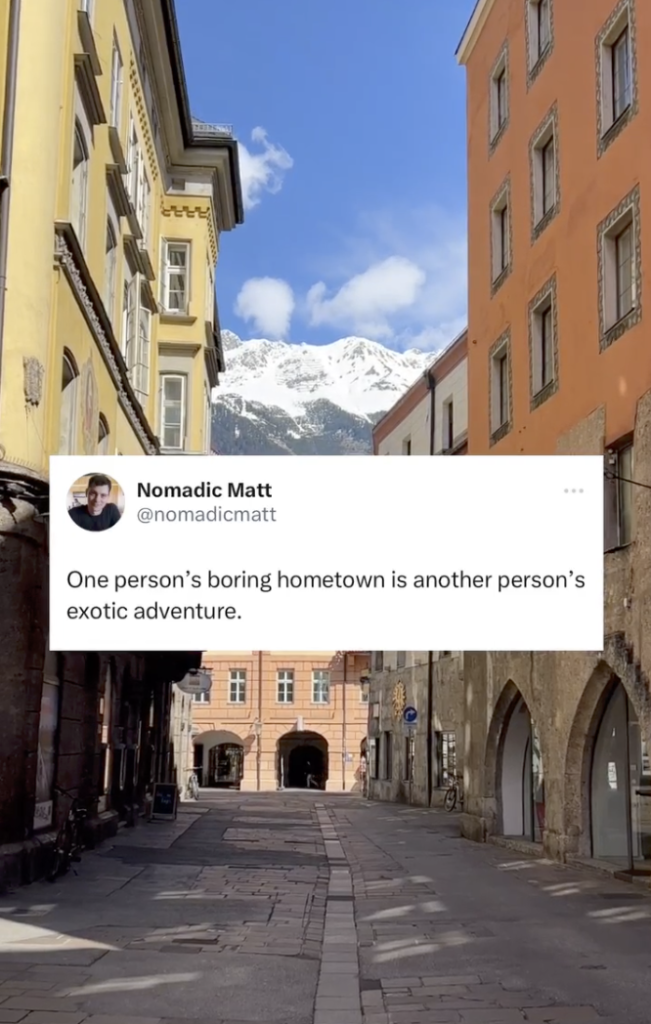At 18:00, standing at Central Station, waiting on a delayed train after having wrapped up another workday, drenched from the relentless rain, and seeking solace in the online world of social media. However, stumbling upon someone you kind of know from high school demonstrating their fantastic life as digital nomad on Bali and ‘Ten reasons why you should be a nomad too’ is the final blow on the random Tuesday night for me (and I suspect I’m not alone in this sentiment).

A post of nomacollectivehq on Instagram https://www.instagram.com/p/CljULRijbvn/
The trendy portrayal of the digital nomad lifestyle, exploring corners of the world that still have affordable — to western standards, accommodations, endless sunshine and exciting landscapes, has gained popularity in recent years. However, it has also attracted its fair share of skepticism. It’s crucial not to dismiss this critique as mere jealousy, as I genuinely believe there are inherent and controversial issues with the understanding of this digital nomad lifestyle. With some, a rather radical perspective, viewing it as a form of neocolonialism — in essence the continuation of colonial power structures through economic, and or cultural means. In a globalised world, in some sense this is inevitable consequence. Yet, I the idea of the digital nomad lifestyle, despite its global appeal, might inadvertently contribute to a sense of detachment and disruption of local communities and the erosion or appropriation of cultural tradition.
In an interesting article by Sabina, the concept of social media de-localising the local is explored. I want to further this idea which not only removes the local context but also disrupt the connection to its original community significance. For instance, Balinese locals are fed up with the escalating post-work party culture on the island 8,000 have signed a petition that condemns the noise disturbance, public drunkenness and drug consumption. This detachment happens as social media platforms (Instagram, TikTok) often oversimplify and commodity or misjudge the essence of local cultures, reducing them to superficial representation for the eye of the viewer. Additionally, the pursuit of shares, likes and validation can overshadow the nuanced narratives that truly define local tradition.

A post of Nomadic Matt on Instagram https://www.instagram.com/reel/Cwkwv-soncE/?utm_source=ig_web_copy_link&igshid=ODhhZWM5NmIwOQ==
Furthermore, the rise of digital nomadism brings forward the question of the traditional notion of community, reflecting on the transformative nature of belonging in this interconnected world. Firstly, the key aspect of the nomadic lifestyle challenges our understanding of ‘local’ communities as a geographical entity. The digital nomad’s centre of interest, more than geographical pinpoint which often share linguistic, historical or cultural backgrounds, lies more in virtual communities, with websites and social media accounts existing to meet other nomads. Often they rely on online platforms and co-working spaces, these digital infrastructures facilitate the online networks of connection, yet often work outside of traditional community networks. The impact of these kind of virtual community have lead to an rise of gentrification and the commodification of local culture, as exemplified by the case of nomadic paradise Bali again.
We have entered the era of globalised living. Yet, the manifestation and privilege, particularly with a note to Western context, to travel and reside wherever we want often overshadows the notion of cultural sensitivity. The challenge ahead lies in the creation of a global community that not only embraces local tradition but actively works towards the idea of co-existence in this tradition. The digital realm has a big role to play within the shaping of this global community, starting with ‘Ten reasons why you should be a nomad too (but be sensitive to local communities and tradition please!!)’
Sources
Beckman, Jonathan. 21AD. Review of Don’t Settle: The Rise of Digital Nomads. The Economist, March 21AD. https://www.economist.com/1843/2018/03/21/dont-settle-the-rise-of-digital-nomads?
Hennigan, Rowena. 2023. “How to Become a Digital Nomad.” Harvard Business Review. February 8, 2023. https://hbr.org/2023/02/how-to-become-a-digital-nomad.


Hi Yentl! Thank you for referring to my blog!
I find your approach very interesting and above all extremely relevant!
I have seen the “phenomenon” of gentrification due to digital nomadism firsthand in my natal city. I was born in Mexico City and lived in the same neighborhood for 15 years, in such a huge metropolitan area, it was just another area that was just gaining “recognition” as some Mexican creatives were moving around there. From the pandemic on, I started seeing it change due to many foreigners moving to that particular area and I constantly heard the statement “Mexico City is soooooo cheap”.
It is cheap for them, as they mostly earn their salaries in euros or dollars and spend in Mexican pesos (the national currency) which allows for a great lifestyle. Nevertheless, it has excluded many out of the central areas of the metropolis by increasing the rent prices tremendously, which then excludes the people in the closer areas and so a pattern of rings of exclusion begins.
I resonate with this post and agree with you that there needs to be a consideration when moving abroad to places that are in other economic situations. (and anywhere!)
Hi Yentl, what an interesting topic. My personal view on this is that we are in a period of transition into a globalized world. Through the internet/social media we are interconnected to (most of the) cultures of the world and therefore we feel we already have some kind of a globalized perspective. What we don’t realize is that social media show you what you already like, and therefore you don’t counter things that different then what you think. While in the real world, we aren’t yet as globalized as we think we are. We are in a time of facing the difficulties of these various cultures trying to live together and the challenges that come with building a ‘global village’. In reality, this globalized life is much harder than social media tries to make you think and the challenges that need to be faced (as stated in your blog) are just starting to begin.
Really insightful blog!! I have never thought about digital nomadism through the concept of neocolonialism. But it definitely makes sense. Moreover, I really can feel the issue of not perceiving your homeland as something interesting, while people online like to romanticise it. While being from Eastern Europe, it can be a bit weird or funny seeing people online finding regular, boring or even ugly things in Eastern Europe aesthetically pleasing. My case is not really seen in digital nomadism, however it also shows the view on other countries through that Western perspective you mentioned
ive often looked at the nomadic lifestyle and one day hoped that i could do that but in reality i would be lacking in the comforts of a lived in home. those digital and physical comforts you cant quite carry with you. i have been to bali myself and seeing the difference between tourists and locals is striking. i still cant believe how cheap everything is. i think you’re right on how the culture is being commodified. if one does live a truly nomadic way and still travels from country to country i do think it would help with the issues regarding cultural sensitivity without causing any unneeded gentrification.
Hello Yentl, thanks for sharing your thoughts on the phenomenon of digital nomadism. In a way the concept of transforming one’s local and personal context through digital tools reminded me of Tom Boellstorff’s, “Coming of Age in Second Life”. In it the author argues that “the age of Techne marks a worldview in which aspects of selfhood formerly seen as natural or derived from group membership can be seen as produced through creativity”. To some extent this is what happens in digital nomadism, where individuals leverage technology to question and overcome their previously limited socio-economic, as well as geographical limitations.
Given some of the discussion comments, it would seem interesting to investigate to what extent the asymmetrical distribution of technological capabilities is leading to unequal access to the opportunities provided by digital nomadism.
Source:
Boellstorff, Tom. Coming of Age in Second Life: An Anthropologist Explores the Virtually Human. Revised edition. Princeton: Princeton University Press, 2015.